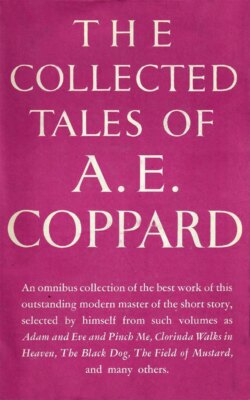The Collected Tales of A. E. Coppard

Реклама. ООО «ЛитРес», ИНН: 7719571260.
Оглавление
A. E. (Alfred Edgar) Coppard. The Collected Tales of A. E. Coppard
FOREWORD
THE CHERRY TREE
THE POOR MAN
THE BALLET GIRL
ARABESQUE—THE MOUSE
ALAS, POOR BOLLINGTON!
DUSKY RUTH
THE OLD VENERABLE
ADAM AND EVE AND PINCH ME
THE PRESSER
THE GREEN DRAKE
ABEL STAPLE DISAPPROVES
PURL AND PLAIN
A BROADSHEET BALLAD
SILVER CIRCUS
LUXURY
THE FAIR YOUNG WILLOWY TREE
MY HUNDREDTH TALE
RING THE BELLS OF HEAVEN
NIXEY’S HARLEQUIN
JUDITH
FATHER RAVEN
THE MAN FROM KILSHEELAN
OLIVE AND CAMILLA
CLORINDA WALKS IN HEAVEN
DOE
FINE FEATHERS
CHRISTINE’S LETTER
AHOY, SAILOR BOY!
NINEPENNY FLUTE
A LITTLE BOY LOST
THE LITTLE MISTRESS
FISHMONGER’S FIDDLE
THE HURLY BURLY
THE FIELD OF MUSTARD
THE THIRD PRIZE
THE WATERCRESS GIRL
FIFTY POUNDS
Отрывок из книги
In preparing this American omnibus collection of my tales I debated whether to risk saying one or two things about them—and myself. For there are dangers either way. Twenty years ago my Collected Poems were published by Mr. Knopf and in the introduction I committed the indiscretion of stating that I had nothing much to say about my poems except that I liked them myself. This unbearable effrontery annoyed some reviewers; you might truly have thought I had tried to sell the American public a lot of junk, which I now immodestly declare was then, and still is, very far from being my opinion.
So now about these tales: I refrain from owning that I like them myself merely as a precautionary measure, justifiable on the grounds of previous experience and present expedience, and not as an indication of my regard for them one way or the other. My blatant humility is urging me not to leave it at that, but there are just two things I really must say about short stories in general and their principles of manufacture. First, I want to crush the assumption that the short story and the novel are manifestations of one principle of fiction, differentiated merely by size, that the novel is inherently and naturally the substantial and therefore the important piece of work, the bale of tweed—you may suppose—out of which your golfer gets his plus-four suit, the short story being merely a remnant, the rag or two left over to make the caddie a cap. In fact the relationship of the short story to the novel amounts to nothing at all. The novel is a distinct form of art having a pedigree and practice of hardly more than a couple of hundred years; the short story, so far from being its offspring, is an ancient art originating in the folk tale, which was a thing of joy even before writing, not to mention printing, was invented. Put the beginning of English printing in the last quarter of the fifteenth century and you light on a date when the folk tale lost its oral or spoken form and issued as a printed short story. Moreover, it was only through that same device of printing that the novel became even a possibility; it did not materialize until the eighteenth century, its forerunners being Pilgrim’s Progress and Gulliver’s Travels.
.....
“Oh ah! that’s crooked, a’nt it?”
“Yes, crooked.”
.....